DSCR Loan Master Guide 2025
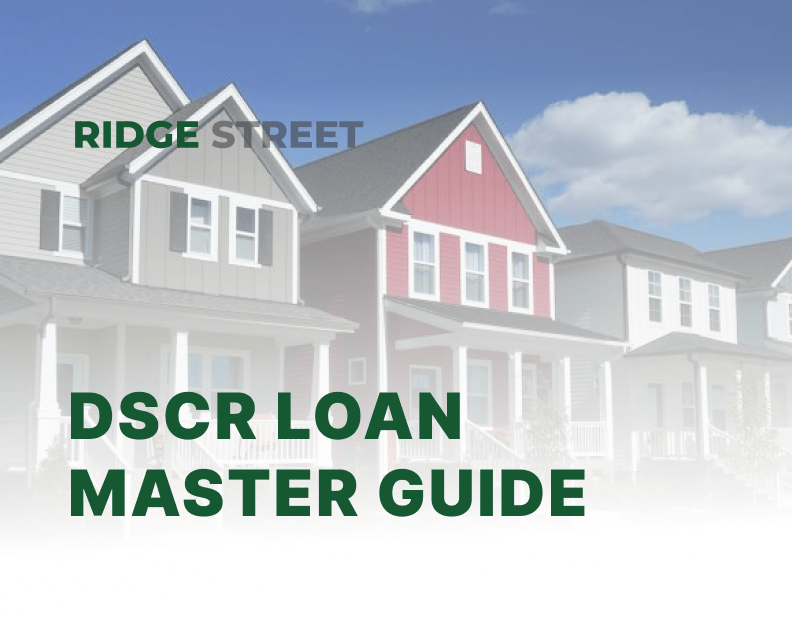
Understanding your financing options as you grow your rental property investment business is essential to your success as a real estate investor. Whether you’re scaling a long-term rental business or you are diversifying into short-term rentals, the financing you choose will directly impact your returns and your abilty to close deals quickly.
For most real estate investors, three factors matter most when choosing a lending partner:
- Cost of financing (rates and fees)
- Closing time and efficiency
- Reliability of execution
This guide is designed to be the most complete reference on DSCR loans available. It starts with the basics - what DSCR loans are, how to calculate DSCR, and why it matters - and then progressively digs deeper into advanced scenarios, refinancing strategies, and process details.
By the end, you’ll have a clear roadmap of:
- How DSCR loans work
- How to evaluate if a DSCR loan fits your investment scenario
- What the process looks like from start to finish
- How to apply and maximize your financing options
What Is a DSCR Loan?
A DSCR loan is a type of investment property financing that qualifies the borrower based on the property’s cash flow, instead of a borrower’s personal income.
DSCR stands for Debt Service Coverage Ratio, which is a simple financial ratio comparing a property’s rental income (or projected rental income) to its monthly debt obligations, property taxes, insurance, and HOA fees (if applicable)

Where:
- Rent= Actual Rent Collected (Appraiser’s Market Rent OR AirDNA Short Term Rent Projection)
- Monthly Debt Service = Principal + Interest + Taxes + Insurance (+ Association dues, if applicable)
Why DSCR Matters?
DSCR is important because it demonstrates that the property’s rental income will cover the costs to own and operate the property. This ratio is relevant to rental property investors because, as an investor, you want to make sure that your property generates positive earnings. If your DSCR is less than one, it means that your property costs more to own and operate, than rental revenue it generates.
Similarily, a DSCR Lender wants to make sure that you can make payments on your loan with out any additional income other than the revenue generated from the rental property itself.
How To Calculate DSCR On A Real Example
Let’s analyze a real rental property in Texas:
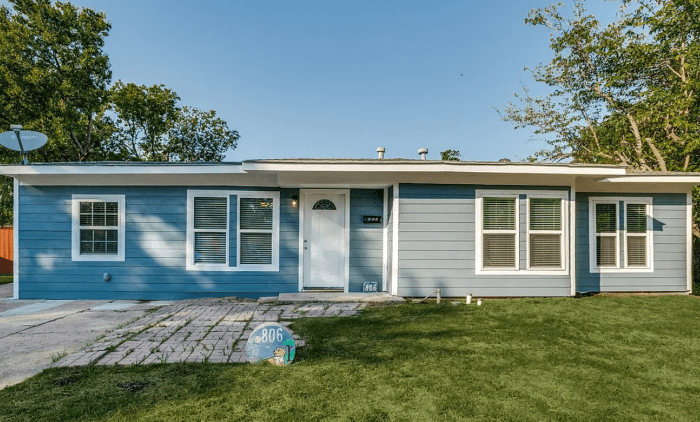
Purchase Price: $260,000 (example property on Zillow).
Estimated Rent: $2,134/month (using Zillow Rental Estimator; final figure determined by appraisal).

Taxes: $5,789/year or $482.42/month (from Zillow tax history).

Insurance: Conservatively estimated at 1% of purchase price = $2,600/year or $216.67/month
P&I Payment: At 7.0% interest, 30-year fixed, loan amount $208,000 (80% LTV) → $1,383.83/month.
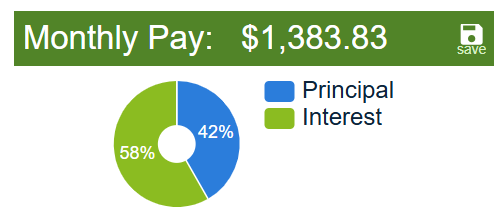
Monthly Breakdown:
- Rent = $2,134
- Monthly Debt Service = $1,383.83 + $482.42 + $216.67 = $2,082.92
- DSCR = $2,134 ÷ $2,082.92 = 1.025 ✅ Passes DSCR requirement
The DSCR ratio of the property is above 1, which means the property will cash flow and will qualify for a DSCR loan. To analyze and calculate the DSCR ratio on prospective investment properties, use our DSCR Calculator.
DSCR Loans vs. Conventional Loans
Now that you have a solid underrstanding of what a dscr loan is and how it works, the logical next questions is: How do DSCR Loans differ form Conventional Financing?
The chart below provides a detailed comparison:
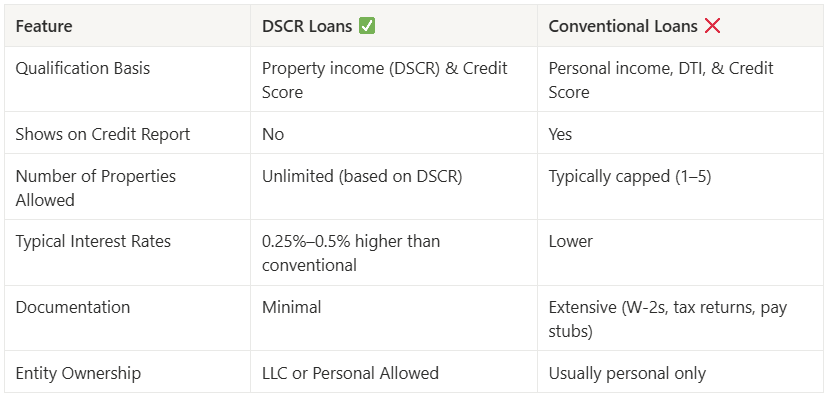
Key Takeaway: While conventional loans can be slightly cheaper, DSCR loans allow far greater scalability. Investors often use a blend of both depending on their portfolio strategy.
We’ve also written a full article on the Difference Between Conventional and DSCR Loans, if you want a more detailed comparison.
DSCR Rates
This section provides a breakdown of how DSCR Loan Rates are determined as well as instructions on how you can check your estimated DSCR Loan Rate.
Understanding How DSCR Rates Are Determined
Interest rates for DSCR loans are not arbitrary, they are tied two two factors: 1. Industry Benchmark Rates for other Long Term Debt Products, 2. Risk Of Default Premiums.
DSCR rates are determined using the following formula:

The U.S. 2YR Treasury Index is the rate at which the U.S. government lends money (via Bonds) on a 2 Year Term. This is considered the Base Rate (Risk Free Rate) for most debt offerings. As such, this index is used as a benchmark for DSCR Loan Rates - i.e. as the US 2 YR Treasury Bond Yield falls, so do DSCR Loan Rates. You can check the current Base Rate Index here: U.S. 2 YR Treasury Yield.
A DSCR Lender (like Ridge Street), then adds premiums to this base rate to adjust for the added risk of a DSCR loan. A breakdown of the risk premiums are shown below:
Risk Premium
- Factors include:
- Credit score
- Loan-to-Value (LTV)
- Property type
- Long Term Rental V.S. Short Term Rental
- Transaction Type: Purchase V.S. Cash Out Refinance
- Ammortization Type: Fully Ammortizing V.S. Interest Only
- DSCR Ratio
Example Of DSCR Rate Calculation

The example above outlines how different factors affect the final DSCR loan rate. It is important to mention that the actual premiums that DSCR Lenders use to calculate the rates of DSCR loans are proprietary. To get a formal quote on a DSCR loan scenario, you can request a Term Sheet here: Get A DSCR Loan Quote.
Understanding DSCR Loan Ammortization and Interest Only Options
Standard DSCR Loans are fully amortizing over 30 years. This means, every month the mortgage payment goes towards paying down the principle balance and towards paying the interest of the loan.
In some cases, investors will chose to have a DSCR Loan with an interest only period for the first 10 years in exchange for a lower payment and a slightly higher interest rate. By not paying down the principle of the loan, the monthly DSCR loan payment becomes lower. This interest only option is considered to be a slightly higher risk loan, so the interest rates are higher than the standard fully amortizing DSCR loans.
DSCR Loans for Cash Out Refinances
So far we’ve focused on DSCR loans for purchase transactions. But, DSCR loans are very commonly used for refinancing rental properties to obtain a lower rate or to pull equity out of a property (a.k.a. “cash out”).
The two types of refinance transactions are:
- Rate & Term Refinance: Replace an existing mortgage with better terms.
- Cash-Out Refinance: Obtain leverage on a property by borrowing more than you owe. Rates are usually slightly higher for cash-out (≈0.20%) because lenders view it as slightly riskier.
With refinances, the basic principal of a DSCR loan still applies: The rent collected on the property must be greater than, the cost of the mortgage, taxes, and insurance.
Important Notes About Refinancing With A DSCR Loan
- When ever you finance a property, you will pay closing costs including the cost of title work, an Appraisal, and Taxes & Insurance escrows.
- For Rate & Term Refinances, the maximum leverage on a DSCR loan is 80%. On a Cash Out Refinance DSCR Loan, the maximum leverage available is 75% of the appraised value.
- Leverage (LTV %) is calculated based on the appraised value of the property.
How DSCR Loans Work with the BRRRR Strategy
If you’re reading this guide, you may have heard the term: BRRRR — which stands for Buy, Rehab, Rent, Refinance, Repeat. This is an investment strategy where real estate investors buy a distressed property, renovate it, and then refinance/cash out the property based on the new value and cashflow. The BRRRR Strategy is extremely popular because, when it’s done right, investors can obtain a rental property and regain the initial cash they invested in the project at the completion of the BRRRR project. This makes it a very scalable strategy for investors to obtain 1-2 properties per year.
Let’s look at an actual BRRRR Project Example:
-min.png)
Overview:
- An investor bought a distressed single family home for $285K using a fix and flip loan (also called a hard money loan).
- $90,000 of renovations were completed over 6 months.
- The property then was rented for $3,600/month.
- The propety appraised for $525,000.
- The project was then refinanced with a Cash Out DSCR Loan at 75% LTV for a total loan amount of $393,750.
- With the dscr loan in place, the monthly cashflow of the property looks like this:
- Rent: $3,600
- Principle & Interest Payment: $2,659.42
- Monthly Taxes: $330
- Monthly Insurance: $360
- Net Operating Income: $250.58
Again, since the DSCR loan covered the cost of the original purchase plus renovation, the borrower was able to obtain a long term rental property and recoup their initial investment.
If you want to analyze pontential BRRRR Investments that you’re considering, we created this BRRRR Calculator to help with your analysis.
Seasoning Requirements When Refinancing With A DSCR Loan
One last important peice of information relating to this BRRRR Strategy and DSCR Loan Refinances, is that DSCR loans have a seasoning period requirement. This means that if you want to “Cash Out” more than the original cost sunk into the project (Purchase + Rehab), you must wait 6 months from the original purchase
If you only want to recoup the original purchase + renovation costs, then there is no seasoning period for DSCR loans.
Closing a DSCR Loan in an LLC
It is very common for real estate investors to purchase rental properties through an LLC. With DSCR Loans, in most states it is optional to close a DSCR Loan in an LLC or in an investors personal name.
Here’s an overview of why LLC’s are used and how you can set one up for your business, if you haven’t already done so.
Why Investors Use LLCs
- Liability Protection. When a rental property is purchased “through an LLC”, this means that the Limited Liability Company is the legal owner of the property and the investor (aka the gaurantor), is the manager of the entity. In the event that there is an accident at the property, lawsuit, city tax lien, etc., it is ultimately the entity that is liable first. As the manager of the entity you may still have liability, but this structure is seen as a best practice to provide a “layer of protection”.
- Privacy. Depending where the LLC is registered, states like “Wyoming” do not puclically disclose the ownership information of the LLC in public record. This privacy is desirable for some investors.
- Organized Accounting. When an LLC is formed, a business bank account can be obtained which allows investors to more easily manage accounting for their business separetly from their personal finances.
- Loans don’t appear on personal credit report. Since the borrowing party is the LLC, DSCR loans do not report to the gaurantor’s personal credit. This helps investors avoid credit utilization penalties and helps maintain FICO Scores, which is a common issue with conventional financing on investment properties.
Setting Up an LLC
Setting up an LLC is straight forward in most states. There are “out-of-the-box” services that will setup your entity for $200-$300 and serve as your registered agent in the state that you are operating in. At Ridge Street, we recommend Northwest Registered Agent for setting up an LLC. They provide the full cycle entity formation service and plenty high quality info on the steps to setting up a company in each of the 50 States.Here is there comprehensive, LLC Formation Guide (Northwest Registered Agent).
Required LLC Documents For A DSCR Loan
From a DSCR Loan perspective, the only documents we will collect relating to you LLC are:
- Articles of Formation
- Operating Agreement
- EIN
- Certificate Of Good Standing
- Business Bank Statement
DSCR Loan Process
The process for closing a DSCR Loan varies by Lender. Standard DSCR Lenders take 30-45 days to closing. The best dscr lenders can close in 21-25 days.
Below is a step-by-step overview of each stage in the DSCR Loan Process
- Pre-Screening.In this stage, you as the investor should prescreen your property to check if your property may be eligible for DSCR financing. You can use Ridge Street’s DSCR Calculator or Schedule A Call with a DSCR Loan Expert.
- Request Term Sheet or Pre-Approval.Once you have an idea of whether or not your property may be a good fit for a DSCR loan, you can then request a formal quote (also called a Term Sheet) for your DSCR Loan. (Request A Term Sheet)
- Get Property Under Contract.If you’re purchasing a Porperty, you’re next step is to make an offer and obtained an executed Purchase Contract from the Seller. If you are refinancing, you can skip this step and move to step 4.
- Complete a Loan Applicaiton and Pay Appraisal Invoice.At this stage you should have a contract to purchase a property or have reviewed a Term Sheet and be ready to move forward with your DSCR Loan. In this stage, you will complete a formal loan application where your personal info will be collected, credit will be checked, and an appraisal will be ordered. Once the appraisal is ordered, the quoted rate of your DSCR loan will be locked for 45 days. This way, the terms that you agreed to will not fluctuate with changes in the market while the remainder of the loan is being processed.
- Collect Documentation.In this processing stage, you will provide:
- ID
- Entity Docs
- Rental Contract (If Refinance)
- Bank Statement
- Voided CheckThere is no personal income verification required.
- Quality Control Review.Once the appraisal is returned, the file will be moved into Internal Quality Control Review. In this stage, our team checks to make sure the documents you provided are in good standing. (Valid ID, Valid Entity Documents, Cash to Close is Verified, etc).
- Schedule Closing.Once the loan passes through quality review, the loan will be moved into closing. Closing is typically scheduled 2-3 days after the loan is formally approved.
- Funding.On the day of closing, you will sign docs in person - either at your local title office or a mobile notary will meet you at a location of your chosing (work, home, coffee shop, etc.) with the package for you to sign. Funding happens within 24 hours of the lender receiving scanned copies of the executed loan package from the title company.
Requirements To Get a DSCR Loan
Below is checklist for the borrower requirements, property requirements, and document requirements needed for a DSCR Loan.
Borrower Requirements
- Credit Score: 660+
- No mortgage lates in past 24 months
- Liquidity: Down Payment + Closing Costs + 6 Months PITIA
- First-time investors allowed
- Individual or LLC borrower
- U.S. Citizen or Permanent Resident
Property Requirements
- Property type: 1–4 unit residential or small multifamily (5–10 units)
- DSCR > 1.0
- Property must be rent-ready
- Vacant properties permitted
Document Checklist
- Photo ID
- Bank Statement
- Entity Documents (if LLC)
- Appraisal (ordered by lender)
- Completed Loan Application
DSCR Loans for Long-Term vs. Short-Term Rentals
With the advent of Airbnb, short term rentals are growing in popularity with real estate investors because of their ability to generate higher revenues than most long term rentals. In many cases, short term rental strategy are being used to make properties cash flow positive in higher ticket markets and rural markets that wouldn’t otherwise be feasible with long term rentals.
On the financing side, DSCR for Short Term Rentals are sometimes called DSCR Loans for Airbnb, Airbnb Loans, and Short Term Rental Loans. (All of these phrases refer to the same loan product)
The main difference between DSCR for STR and LTR, is that the projected rent for the property is based on the Short Term Rental Revenue Projection from AirDNA. AirDNA is a data analysis tool that aggregates short term rental history from Airbnbs across the U.S. and makes a projection about a property based on the comparable properties with similar specifications.
Below is comparison of DSCR Loans for Long Term Rentals and DSCR Loans for Short Term Rentals:
Long-Term Rentals (LTR):
- Rent determined by appraiser’s market rent.
- No landlord experience required.
- Slightly lower interest rates.
Short-Term Rentals (STR):
- Cash flow estimated with AirDNA cashflow projection.
- Require some real estate experience (1 other rental or a personal mortgage).
- Slightly higher rates (≈+0.25%).
- Higher income potential but more management intensive.
DSCR Loan Case Studies
As we approach the end of this comprehensive DSCR loan guide, here a 3 case studies of real DSCR loans for various rental strategies, transaction types, asset types, and borrower profiles.
Case Study 1: DSCR Loan Purchase Transaction
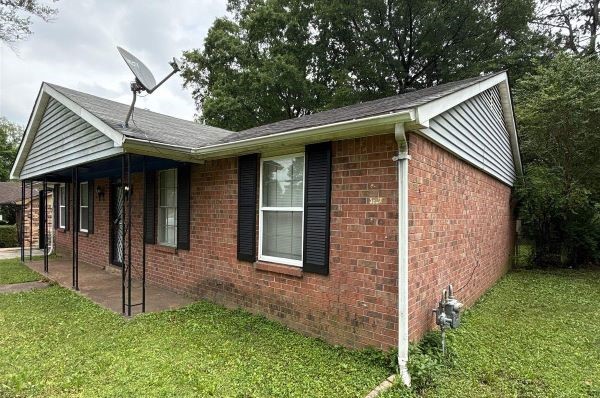
This first time investor purchased a single fmaily rental property in Memphis, TN. Below is a breakdown of the relevant transaction figures:
- Purchase Price: $118,000
- Appraised Rent: $1,200/month
- Loan Amount: $94,400 (80% LTV)
- Rate: 7.375%
- Taxes: $1,200/year
- Insurance: $1,180/year
- P&I: $652/month
- DSCR = 1.41
Case Study 2: DSCR Cash-Out Refinance (Portfolio)
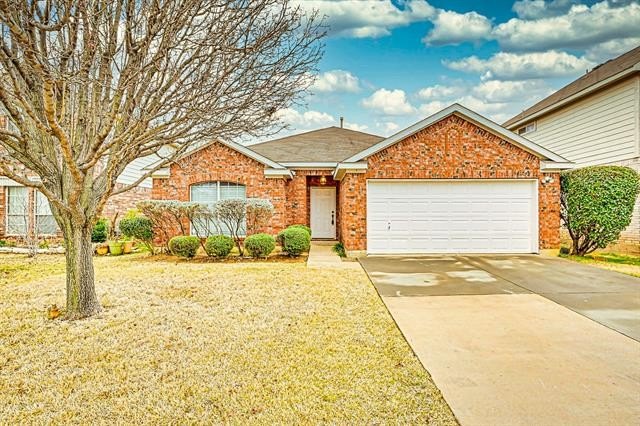
This experienced real estate investment power couple, used a DSCR Loan to cash out refinance 6 of their properties so that they could obtain more real estate with the cash out proceeds. See the relevant transaction details below:
- Appraised Portfolio Value: $1,653,000
- Total Actual Rent: $13,200/month
- Loan Amount: $1,240,000
- Rate: 7.75%
- Total Annual Taxes: $31,405/year
- Total Annual Insurance: $19,615/year
- P&I Payment: $8,883
- DSCR: 1.00
Case Study 3: Airbnb Purchase Transaction
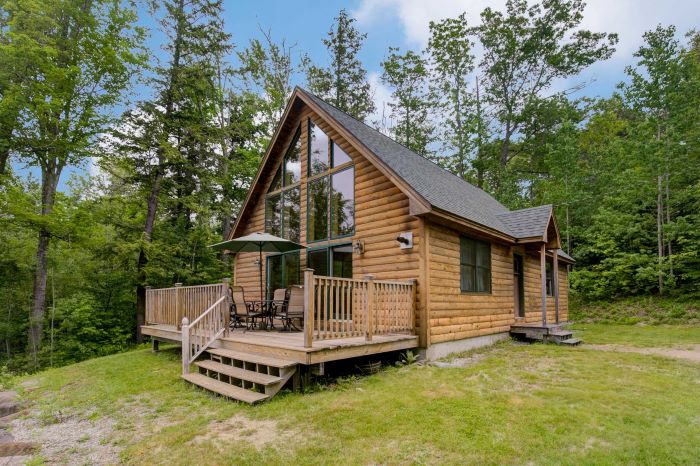
This first time airbnb investor purchased this cabin in New Hampshire, with a DSCR loan. See the deal figures below:
- Purchase Price: $725,000
- AirDNA Revenue Estimate: $71,000/year
- Loan Amount: $580,000
- Rate: 7.275%
- Annual Taxes: $3,760/year
- Annual Insurance: $2945/year
- P&I Payment: $3,996/month
- DSCR = 1.30
Closing Costs in DSCR Loans
As we close out this guide on DSCR Loans, its time that we talk about the closing costs of a DSCR loan.
Standard Costs Include:
- Appraisal. Appraisal costs are typically between $600-$750 depending on the location of the property.
- Title & Escrow fees. Whenever, a property is financed a Lender’s Title Insurance Policy will have to be obtained. On small loans, title insurance costs about $1,000 and on larger loans over a million dollars, a title insurance policy typically costs $3,000-$4,000. Additionally, the actual title company typically charges $500-$1,500 for there services.
- Recording fees. Whenever you get a Mortgage (DSCR Loan), that document is recorded in the county where the property is located. Typically, county recording fees are $100-$400.
- Lender fees. On a DSCR loan, there are two types of Lender Fees: 1. Origination Fee and 2. Legal/Underwriting Fees. Some DSCR lenders, like Ridge Street Capital, offers DSCR loans with 0% Origination Fees but most DSCR Lenders charge 1-2% of the loan amount. Then, there is a standard $1,995 Legal and Underwriting Fee on most DSCR Loans.
- Prepaid Taxes & Insurance Escrow. In your monthly payment on a DSCR loan, you will pay the expected monthly taxes and insurance. At the end of the year, the lender then pays the annual taxes and insurance from the Taxes and Insurance Reserve you’ve been paying intp. Typically, at closing you will also pay 2-3 Months of Taxes of insurance up front (called an Escrow) in the event that your taxes and insurance increase year over year.
Then there are two other types of fees that may be present in a DSCR loan transaction based on the region — the two types of fees are: transfer tax and mortgage tax.
- Transfer Tax. Most states do not impose a “transfer tax” when you purchase a peice of real estate. However, places like Pennsylvania and Massachusetts charge a tax between 0.5% to 2% of the purchase price which is split 50/50 between buyer and seller.
- Mortgage Tax. Most states do not impose a mortgage tax. However, some states like New York and Maryland impose mortgage tax between 0.25% and 1.5 of the loan amount.
How To Apply for a DSCR Loan
Applying for a DSCR Loan is simple. Simply, complete a Quick Application or Pre-Approval Form on the “Get Started” page of this site.
Other Frequently Asked Questions
1. Can I Get A DSCR Loan under $100K?
Yes, some lenders can finance properties below 100K. Ridge Street Capital, finances properties valued at as little as $75,000 with loan amounts down to $55,000.
2. What is the minimum DSCR ratio for approval?
A Debt-Servide-Coverage Ratio of 1.0 is required by most DSCR Lenders.
3. Can foreign nationals qualify?
Yes, some lenders allow foreign nationals with higher down payments. Ridge Street does not lend to foreign nationals who do not have permanent residency.
4. How fast can I close a DSCR loan?
Typical timeline: 3–4 weeks, faster with appraisal and docs ready.
5. Are prepayment penalties common?
Yes, most DSCR loans include a prepayment penalty (often step-down over 3–5 years). 0 YR and 1 YR PPP are also available.
6. Can I get a DSCR loan if I’m self-employed / have low taxable income?
Yes, qualification is based on the cash flow of the property not your personal income.
7. What types of properties are eligible for DSCR Loan?
The following property types are eligible:
- Single Family Residential
- 2-4 Unit Residential
- 5-10 Unit Multimafamily
8. Are DSCR loans more expensive / do they have higher interest rates?
DSCR Loan rates are extremely competitive. Typically, DSCR rates are 0.25%-0.5% higher than conventional rates.
9. What happens if DSCR changes over time?
DSCR Loans are issued based on the condition of the scenario at the time of financing. As long as payments are continually made on your loan, no changes to your loan terms will be made.
Final Comments On DSCR Loans
DSCR loans are one of the most powerful tools for scaling a rental property portfolio. By qualifying based on property income rather than personal income, they allow investors to:
- Acquire more properties without hitting conventional loan limitations.
- Structure deals in LLCs for liability and credit separation.
- Pursue both LTR and STR investment strategies.
Whether you’re looking to purchase, refinance, or cash out, understanding DSCR is the key to unlocking growth in your real estate business.

Funding For Purchase + Rehab

$50,000 up to $3,000,000

Interest Rate 10.5%-11.75%

Origination Fee From 1.5%

Up to 90% of Purchase and 100% of Rehab


Perfect for first-time investors or experienced investors scaling their rental portfolio.
.png)
Designed for investors pursuing higher rents with a short term rental strategy.









.png)
.svg)
.png)

.png)
-min.png)
.png)
-min.png)







